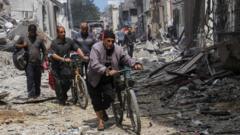The recent surge of Israeli airstrikes in the Gaza Strip has led to the displacement of hundreds of families, igniting fears of an escalating humanitarian crisis. Eyewitnesses report rescue teams have recovered five casualties, with numerous injured civilians being rushed to local hospitals. This wave of bombardment marks another intensification of hostilities, drawing criticism and renewed calls for a ceasefire as pressure mounts on Prime Minister Benjamin Netanyahu to alter the trajectory of the conflict.
Escalating Strikes in Gaza Displace Hundreds, Spark Humanitarian Crisis

Escalating Strikes in Gaza Displace Hundreds, Spark Humanitarian Crisis
Intense Israeli airstrikes lead to mass evacuations in Gaza, raising humanitarian concerns as casualties mount.
Gaza City has seen a series of heavy air raids targeting populated neighborhoods, particularly eastern areas like Shujaiya, Tuffah, and Zeitoun. Activists sharing videos online depicted the horror as explosions lit up the night skies, with smoke and flames casting a grim shadow over the urban landscape. Among the tragic incidents, a strike on a school in Zeitoun that was providing shelter to displaced families resulted in significant casualties.
In the wake of these assaults, the Israel Defense Forces (IDF) ordered evacuations from parts of northern Gaza, yet it seems many fled only westward within the city rather than comply with the guidance to head south. One impactful voice amid the chaos belongs to Abeer Talba, a mother of seven, who shared her agonizing experience: “We had no choice but to leave everything behind… My children are starving. Death feels kinder than this.”
As humanitarian conditions deteriorate, there are increasing concerns that these military actions might signify a shift toward a more extensive ground offensive. Israeli media suggests a faction among military leaders believes objectives in Gaza may soon be reached, yet many are increasingly wary about the potential for prolonged guerrilla warfare, raising the specter of further civilian and military casualties.
The political landscape is fraught, as Prime Minister Netanyahu faces intensified scrutiny regarding his military strategies and the pressing need for a resolution to the conflict. While Netanyahu historically favored continued military engagement against Hamas, mounting internal and international pressures may compel him to reconsider and take steps towards a ceasefire. The unfolding situation remains critical as the humanitarian crisis deepens.
In the wake of these assaults, the Israel Defense Forces (IDF) ordered evacuations from parts of northern Gaza, yet it seems many fled only westward within the city rather than comply with the guidance to head south. One impactful voice amid the chaos belongs to Abeer Talba, a mother of seven, who shared her agonizing experience: “We had no choice but to leave everything behind… My children are starving. Death feels kinder than this.”
As humanitarian conditions deteriorate, there are increasing concerns that these military actions might signify a shift toward a more extensive ground offensive. Israeli media suggests a faction among military leaders believes objectives in Gaza may soon be reached, yet many are increasingly wary about the potential for prolonged guerrilla warfare, raising the specter of further civilian and military casualties.
The political landscape is fraught, as Prime Minister Netanyahu faces intensified scrutiny regarding his military strategies and the pressing need for a resolution to the conflict. While Netanyahu historically favored continued military engagement against Hamas, mounting internal and international pressures may compel him to reconsider and take steps towards a ceasefire. The unfolding situation remains critical as the humanitarian crisis deepens.




















